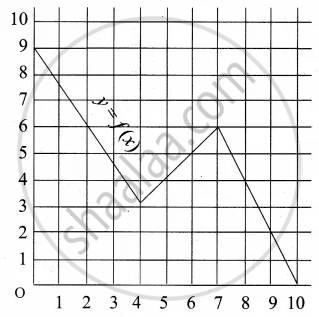Advertisements
Advertisements
Question
Let f(x) = `sqrt(x)` and g(x) = x be two functions defined in the domain R+ ∪ {0}. Find (f – g)(x)
Solution
(f – g)(x)
⇒ (f – g)(x) = f(x) – g(x)
⇒ f(x) – g(x) = `sqrt(x) - x`
APPEARS IN
RELATED QUESTIONS
Let f : R → R and g : C → C be two functions defined as f(x) = x2 and g(x) = x2. Are they equal functions?
Write the range of the real function f(x) = |x|.
If f is a real function satisfying \[f\left( x + \frac{1}{x} \right) = x^2 + \frac{1}{x^2}\]
for all x ∈ R − {0}, then write the expression for f(x).
Which one of the following is not a function?
Let f : R → R be defined by f(x) = 2x + |x|. Then f(2x) + f(−x) − f(x) =
If \[3f\left( x \right) + 5f\left( \frac{1}{x} \right) = \frac{1}{x} - 3\] for all non-zero x, then f(x) =
The domain of definition of the function \[f\left( x \right) = \sqrt{\frac{x - 2}{x + 2}} + \sqrt{\frac{1 - x}{1 + x}}\] is
If f(m) = m2 − 3m + 1, find f(− x)
A function f is defined as follows: f(x) = 5 − x for 0 ≤ x ≤ 4. Find the value of x such that f(x) = 3
If f(x) = ax2 + bx + 2 and f(1) = 3, f(4) = 42, find a and b.
If f(m) = m2 − 3m + 1, find f(x + 1)
Find the domain and range of the following function.
f(x) = 7x2 + 4x − 1
Check the injectivity and surjectivity of the following function.
f : N → N given by f(x) = x3
Express the following exponential equation in logarithmic form
25 = 32
Solve for x.
2 log10 x = `1 + log_10 (x + 11/10)`
Solve for x.
log2 x + log4 x + log16 x = `21/4`
Solve for x.
x + log10 (1 + 2x) = x log10 5 + log10 6
The equation logx2 16 + log2x 64 = 3 has,
Answer the following:
A function f is defined as : f(x) = 5 – x for 0 ≤ x ≤ 4. Find the value of x such that f(x) = 5
Answer the following:
Solve for x, logx (8x – 3) – logx 4 = 2
A graph representing the function f(x) is given in it is clear that f(9) = 2

Describe the following Domain
The data in the adjacent table depicts the length of a person's forehand and their corresponding height. Based on this data, a student finds a relationship between the height (y) and the forehand length (x) as y = ax + b, where a, b are constant.
| Length ‘x’ of forehand (in cm) |
Height 'y' (in inches) |
| 35 | 56 |
| 45 | 65 |
| 50 | 69.5 |
| 55 | 74 |
Find a and b
The data in the adjacent table depicts the length of a person's forehand and their corresponding height. Based on this data, a student finds a relationship between the height (y) and the forehand length (x) as y = ax + b, where a, b are constant.
| Length ‘x’ of forehand (in cm) |
Height 'y' (in inches) |
| 35 | 56 |
| 45 | 65 |
| 50 | 69.5 |
| 55 | 74 |
Find the height of a person whose forehand length is 40 cm
The data in the adjacent table depicts the length of a person's forehand and their corresponding height. Based on this data, a student finds a relationship between the height (y) and the forehand length (x) as y = ax + b, where a, b are constant.
| Length ‘x’ of forehand (in cm) |
Height 'y' (in inches) |
| 35 | 56 |
| 45 | 65 |
| 50 | 69.5 |
| 55 | 74 |
Find the length of forehand of a person if the height is 53.3 inches
The domain of the real valued function f(x) = `sqrt((x - 2)/(3 - x))` is ______.
Find the range of the following functions given by `sqrt(16 - x^2)`
Find the domain of the following functions given by f(x) = `(x^3 - x + 3)/(x^2 - 1)`
Let f(x) = `sqrt(x)` and g(x) = x be two functions defined in the domain R+ ∪ {0}. Find (fg)(x)
Let f(θ) = sin θ (sin θ + sin 3θ) then ______.
